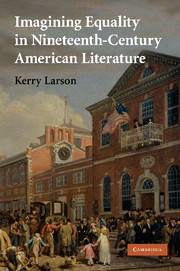3 - The precise spirit of the average mass
Published online by Cambridge University Press: 04 May 2010
Summary
In the inaugural issue of the North American Review, soon to establish itself as the country's leading voice of literary nationalism, there appeared an admiring notice of a volume entitled Moral Pieces in Prose and Verse (1815) by one Lydia Huntley. After commending the “considerable merit” of the poetry and quoting several passages at some length, the unnamed critic takes the opportunity of urging “Miss Huntley” to pursue more native themes in the future. “We have in the way of subjects,” the reviewer grandly declares, in the manner of a salesman showcasing the company wares, “a rich and varied mine that has hardly been opened.” Considering what “the genius of Scott” was able to do with the utterly “rude materials” of petty feuds and tribal warfare on the Scottish highlands, there is no reason why the American artist should not take advantage of much more attractive features closer to home. The countless stirring events surrounding two relatively recent revolutions, one against the French and the other against British, the legends of Indian history, the exploits of the early colonists, and the Puritan past are among the unexplored treasures “furnish[ing] materials at once interesting and grand … that might be rendered highly poetical.” In addition to “the magnificence of the scenery” waiting to be quarried and brought to the page in all its “diversified, animated, and picturesque glory,” there are “the many romantick adventures of individuals” such as “the polished French nobleman from the court of Lewis XIV, the dignified British governour, the hardy American colonist, and the chiefs of the Six Nations” that beckon, each worthy of the notice of any aspiring poet or novelist.
- Type
- Chapter
- Information
- Imagining Equality in Nineteenth-Century American Literature , pp. 75 - 106Publisher: Cambridge University PressPrint publication year: 2008



